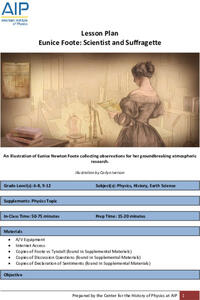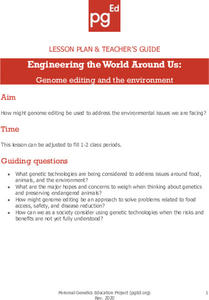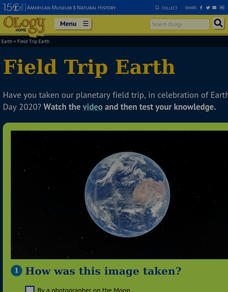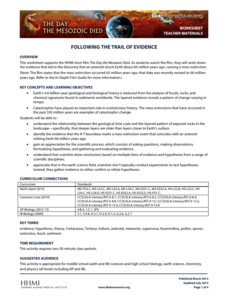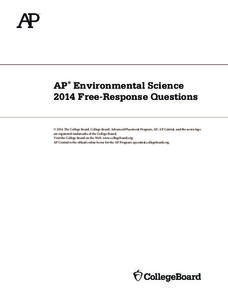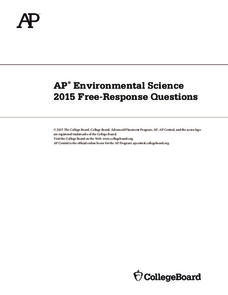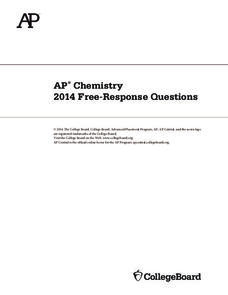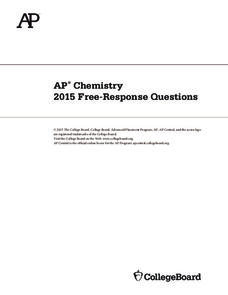K20 LEARN
Microbes and Manure = Biofuel
Waste not, want not! Science scholars explore manure as an alternative energy source through reading and experimentation. Groups construct their own biofuel digesters and observe the process of methane production. The teacher's guide...
K20 LEARN
It's Alive! Or, Is It?
Seems like a fairly simple question—until you begin asking your class! Get pupils acquainted with the characteristics of life through pairs classification, discussion, and scientific reading. The lesson plan, part of the K20 series, also...
American Institute of Physics
Eunice Foote: Scientist and Suffragette
The greenhouse effect and climate change are hot topics in today's news. Young scientists may be surprised to learn that the concept is not a new one. In fact, Eunice Newton Foote, scientist, inventor, and suffragette, discovered the...
American Institute of Physics
Women and the Manhattan Project
The Manhattan Project was a massive undertaking involving multiple sites and thousands of scientists and technicians. To gain an understanding of the women who participated in the project, groups select an oral history of a woman...
American Institute of Physics
Dr. Gates and the Nature of the Universe
What do Russian nesting dolls have to do with physics? They make a great demonstration tool for explaining Dr. Sylvester James Gates, Jr.'s string theory to young scientists. A two-part instructional activity first introduces...
American Institute of Physics
African Americans and Life in a Secret City
Imagine the lure of being offered a job at a secret site, working on a secret project, and earning higher wages! Such was the approach used to recruit African Americans to Hanford, Washington, one of several sites used to develop...
American Institute of Physics
African Americans and the Manhattan Project
A lesson plan about the Manhattan Project will explode young physicists' understanding of the racial attitudes in the United States during and after World war II. Groups select an African American scientist or technician that worked on...
American Institute of Physics
African American Inventors in History
A two-part lesson introduces young historians to the work of famous African American inventors. Groups first research and develop a presentation of an inventor that includes biographical information and information about one of their...
Personal Genetics Education Project
Genome Editing and CRISPR
Explore the excitement and ethical challenges of CRISPR and genetic-editing technology. Participants engage in do-nows, view a slideshow, and collaborate on scenarios about genetic editing. Group members analyze scenarios to generate...
Personal Genetics Education Project
Reproductive Genetic Testing: Technology, Access, and Decision Making
Explore the complexities of reproductive genetic testing respectfully in the learning space. Scientists read articles, view a slideshow, and complete a do-now about genetic technologies. A fishbowl activity allows scholars to discuss the...
Personal Genetics Education Project
Engineering the World Around Us: Genome Editing and the Environment
Challenge young minds to build a better world with genetic engineering. Biologists learn potential solutions for environmental issues using genome editing while interacting with three case studies. Scholars read articles and view...
Children’s Hospital of Philadelphia
Vaccine Safety
Enter the debate on vaccines. Small groups research topics related to vaccine safety in the last lesson in a unit of five. In the process of the research, team members learn how to determine the validity and credibility of a website. The...
Teach Engineering
How Can We Prevent the Corrosion Crisis?
Contemplate the causes of corrosion. An interesting lesson has learners first conduct an experiment where they place nails in different types of water. Based on the results, they consider how corrosion occurs and how engineers need to...
American Museum of Natural History
Field Trip Earth
Take a field trip around Earth by way of satellite images. Learners watch a video lesson that describes different images taken from orbiting satellites. They then test their visual skills in a 14-question online quiz.
National Academy of Sciences
Lights at Night Webquest
Help learners find ways to become more efficient energy consumers. To start, individuals research how different countries address energy efficiency and then analyze their own carbon footprint. They use their research to identify ways to...
College Board
AP Biology Practice Exam 2013
What is the best way to prepare for an AP® exam? Learners become familiar with the AP® Biology exam by completing a full-length practice exam. The AP® test prep by the College Board contains multiple choice, grid-in, and free-response...
Howard Hughes Medical Institute
Pulse Chase Primer: The Meselson-Stahl Experiment
Experimental design can make or break an experiment. Young scholars analyze the pulse-chase analysis procedure by studying the Meselson-Stahl experiment. Using a video presentation, they discover how the pulse-chase analysis led to the...
Howard Hughes Medical Institute
Following the Trail of Evidence
One important skill in analyzing scientific evidence is identifying facts versus opinions. Scholars identify pieces of evidence from the film The Day the Mesozoic Died and then discuss this evidence in small groups at the end of each act...
College Board
2014 AP® Environmental Science Free-Response Questions
Less than half of AP Environmental Science test takers pass each year. The College Board releases previous test questions covering topics from greenhouse gases to ecological succession to help scholars prepare for future assessments. Use...
College Board
2015 AP® Environmental Science Free-Response Questions
Less than eight percent of AP Environmental Science test takers earn the highest score possible. Help scholars improve their scores by using actual test questions on water quality and urban planning before reading sample responses that...
College Board
2016 AP® Environmental Science Free-Response Questions
The average student scores less than three points, out of five, on the AP Environmental Science test. Most do well on the multiple choice and struggle with the free-response section. Encourage extra free-response practice with actual...
College Board
2017 AP® Environmental Science Free-Response Questions
Almost half of test takers passed the AP Environmental Science exam in 2017. Use the free-response questions on the topics of pollution and ecosystems to improve writing skills in preparation for the AP exam. Discuss the scoring...
College Board
2014 AP® Chemistry Free-Response Questions
More than half of AP Chemistry test takers earn a high enough score to get college credit. Improve that statistic by using past test questions including precipitate, molarity, and chemical equations to prepare for a future exam. The...
College Board
2015 AP® Chemistry Free-Response Questions
More than 80,000 scholars earned college credit for Chemistry with the AP exam in 2015. The College Board released the free-response questions covering topics, including moles, that often confuse scholars. They also released example...




